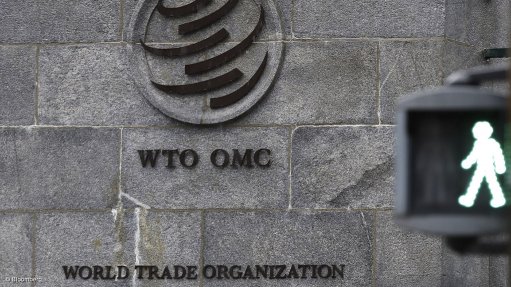Winter rains are starting later in the year – study
The rainy season in South Africa’s winter rainfall region is starting later in the year than it used to, according to a study conducted at the University of Cape Town (UCT).
But Waarith Abrahams, a master’s student at UCT’s Climate Systems Analysis Group who did the research, said further studies would need to be done to establish whether the shifting rainfall season could be attributed to climate change.
"The results kind of suggest that, because the trend is not seen in the long-term data, so it is possible we are already experiencing a shift to a new climate state, being warmer and drier for the region, but you would need additional research to answer that," Abrahams said.
"This study provides an idea of how the rainy season has been changing and what could possibly happen in the future as the climate changes."
Abrahams used historical rainfall data from four SA Weather Services' rainfall stations in the winter rainfall zone: Stellenbosch and Bokveldskloof where rainfall records began in 1978, and Hopefield and Vrugbaar, where records began in 1908 and 1905 respectively.
He found that there was a "statistically significant trend" towards a later start to the rainy season in the last 40 years.
LONGER DRY SEASON
This trend was not seen in the long-term data going back over 100 years.
Abrahams said the later start to the rainy season was likely to have implications for agriculture in the winter rainfall zone and also for water management as the later onset meant a longer dry season.
The start and length of the rainy season was particularly important to Cape Town as the city relied mainly on water from rain-fed dams.
"The dry season is when there is normally higher water consumption, so the trend will be an important consideration for water management strategies going forward. Rain water harvesting is likely to become more important," Abrahams said.
It would also be important to understand the relationship between rainfall and the rate at which groundwater resources were recharged in changing rainfall patterns.
The study also found that the later onset trend was accompanied by an increase in the number of rainy days, but a reduction in the total amount of rainfall. However, the reduction was small and not statistically significant.
The later start of the rains could mean a shorter growing season for agricultural crops.
Richard Krige, a grain farmer and an executive of Grain SA, said the Western Cape’s grain-growing area depended entirely on rain, and did not use irrigation water for the crops.
'CONSERVATION AGRICULTURE'
The four main grain crops were wheat, barely, canola and oats.
He said farmers had noticed a change in the start of the rainy season in some parts of the province, particularly in the Swartland, which got almost all its rain in winter.
"The old people used to say every week you plant later in the season there is a 5% reduction in yield.
"We are seeing a shorter rainy season than in the past, starting in about June to September. And in the southern Cape they’re not seeing the same rain that they usually see in summer," Krige said.
He said the grain area in the eastern part of the southern Cape, from about Heidelberg, got about 60% of its rain in summer and 35% in winter. Around Caledon and Botriver, it was 65% winter rain and 35% summer rain.
Krige said many grain farmers in the province had now started "conservation agriculture" because of the risk they faced with changing rainfall.
He said the Western Cape government’s agriculture department had been pioneering this practice in the province and had helped farmers get started and shown them the benefits at their research farms.
"They've put a lot of work and money into it. One of the pioneer farmers was Jack Human, who said he couldn’t viably harvest on the low rainfall, so he started conservation agriculture. Basically it is farming in such a way that you keep moisture in the soil, so that means minimum tillage, because conventional tillage breaks down the soil structure and accelerates moisture loss," Krige said.
It also means keeping organic matter in the soil, and keeping organic matter on top of the soil, as a kind of mulch.
The old practice of burning the stubble after harvest was dying out, and the stubble kept as cover to retain moisture.
Krige said there were no statistics as to how many farmers were starting to use conservation agriculture, but said there had been a big uptake in the western and southern parts of the Western Cape.
He said their main reason for doing so was to minimise the risk in the face of climate change.
"It’s still not without challenges, but with the later onset of rains, obviously you can’t create a harvest out of fresh air. Rain is instrumental, and low rainfall or late rainfall brings financial pressures. Farmers have to look at ways to be sustainable, so conservation agriculture in not just to be environmentally friendly, it’s a way of surviving in the face of climate change."
Comments
Press Office
Announcements
What's On
Subscribe to improve your user experience...
Option 1 (equivalent of R125 a month):
Receive a weekly copy of Creamer Media's Engineering News & Mining Weekly magazine
(print copy for those in South Africa and e-magazine for those outside of South Africa)
Receive daily email newsletters
Access to full search results
Access archive of magazine back copies
Access to Projects in Progress
Access to ONE Research Report of your choice in PDF format
Option 2 (equivalent of R375 a month):
All benefits from Option 1
PLUS
Access to Creamer Media's Research Channel Africa for ALL Research Reports, in PDF format, on various industrial and mining sectors
including Electricity; Water; Energy Transition; Hydrogen; Roads, Rail and Ports; Coal; Gold; Platinum; Battery Metals; etc.
Already a subscriber?
Forgotten your password?
Receive weekly copy of Creamer Media's Engineering News & Mining Weekly magazine (print copy for those in South Africa and e-magazine for those outside of South Africa)
➕
Recieve daily email newsletters
➕
Access to full search results
➕
Access archive of magazine back copies
➕
Access to Projects in Progress
➕
Access to ONE Research Report of your choice in PDF format
RESEARCH CHANNEL AFRICA
R4500 (equivalent of R375 a month)
SUBSCRIBEAll benefits from Option 1
➕
Access to Creamer Media's Research Channel Africa for ALL Research Reports on various industrial and mining sectors, in PDF format, including on:
Electricity
➕
Water
➕
Energy Transition
➕
Hydrogen
➕
Roads, Rail and Ports
➕
Coal
➕
Gold
➕
Platinum
➕
Battery Metals
➕
etc.
Receive all benefits from Option 1 or Option 2 delivered to numerous people at your company
➕
Multiple User names and Passwords for simultaneous log-ins
➕
Intranet integration access to all in your organisation


















